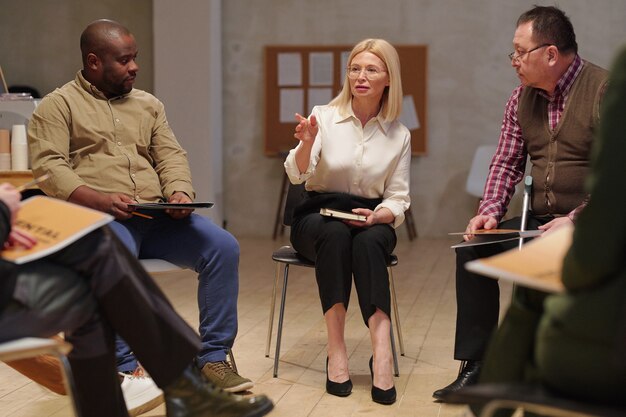Master the Interview: Proven Techniques to Land Your Dream Job

Master the interview by preparing thoroughly, practicing common questions, and showcasing your skills and experience to impress potential employers and secure your dream role.
Ready to master the interview and finally land that dream job? Job interviews can be nerve-wracking, but with the right preparation and techniques, you can confidently showcase your skills and experience, making a lasting impression on potential employers.
Understanding the Interview Landscape
Navigating the interview process requires understanding its multifaceted nature. It’s not just about answering questions; it’s about demonstrating your value and fit within the company culture. Let’s explore key aspects of this landscape.
The Purpose of an Interview
The primary goal of an interview is for the employer to assess whether a candidate possesses the necessary skills, experience, and personality to succeed in the role and contribute to the company’s overall objectives.
Types of Interviews
Understanding the different formats of interviews can help you prepare effectively. Common types include:
- Phone interviews: Often used as an initial screening to narrow down candidates.
- In-person interviews: Provide a more comprehensive assessment of your qualifications and personality.
- Panel interviews: Involve multiple interviewers simultaneously, each focusing on different aspects of your profile.
- Behavioral interviews: Focus on past experiences to predict future performance.

Different interview formats require tailored approaches. For phone interviews, ensure a quiet environment and clear communication. For panel interviews, make eye contact with each interviewer. Behavioral interviews require detailed storytelling about your past experiences.
Crafting Your Interview Narrative
Your interview narrative is the story you tell about yourself, highlighting your skills, experiences, and career aspirations. It’s essential to craft a compelling narrative that resonates with the interviewer and showcases your unique value proposition. Let’s find out how to do it.
Highlighting Your Strengths
Identify your key strengths and accomplishments that align with the job requirements. Prepare specific examples that demonstrate how you’ve applied these strengths in previous roles to achieve tangible results.
Tailoring Your Story
Customize your narrative to match the specific requirements and culture of the company you’re interviewing with. Research the company’s values, mission, and recent projects, and tailor your responses to reflect your understanding and alignment with their goals.
By highlighting your strengths and tailoring your story, you can create a narrative that resonates with the interviewer and positions you as the ideal candidate for the job.
Mastering Common Interview Questions
Preparing for common interview questions is crucial for delivering confident and compelling responses. By anticipating these questions and formulating well-thought-out answers, you can demonstrate your qualifications and showcase your personality. Let’s take a look at some common examples.
“Tell Me About Yourself”
This is your opportunity to make a strong first impression. Provide a concise overview of your background, skills, and career aspirations, highlighting relevant experiences and accomplishments.
“Why Are You Interested in This Role?”
Demonstrate your genuine interest in the role and company by explaining how the position aligns with your career goals and how your skills and experience can contribute to the company’s success.
“What Are Your Strengths and Weaknesses?”
Showcase your strengths that are relevant to the job requirements, and address your weaknesses by acknowledging areas for improvement and demonstrating a commitment to continuous learning.

Practicing these questions out loud can significantly boost your confidence and ensure you deliver coherent and concise answers during the actual interview. Mock interviews with friends or family can provide valuable feedback and help you refine your responses.
Demonstrating Your Skills and Experience
Interviews are a platform to showcase your skills and experience, providing concrete evidence of your capabilities and potential contributions. It’s crucial to articulate how these skills align with the job requirements. Here’s how.
Using the STAR Method
The STAR method (Situation, Task, Action, Result) is a structured approach to answering behavioral questions. Describe the Situation, the Task you were assigned, the Action you took, and the Result you achieved.
Quantifying Your Achievements
Whenever possible, quantify your achievements with numbers and metrics. This provides tangible evidence of your impact and makes your accomplishments more memorable.
- Increased sales by 15% in Q2.
- Reduced project costs by 10% through process improvements.
- Improved customer satisfaction scores by 20% through enhanced service delivery.
Use the STAR method and quantify your achievements whenever possible. This will make your answers clear, concise, and compelling, solidifying your position as a strong contender for the job.
Building Rapport with the Interviewer
Establishing a positive rapport with the interviewer can significantly enhance your overall performance and leave a lasting impression. Building rapport involves creating a connection, demonstrating active listening, and exuding enthusiasm.
Making a Connection
Find common ground with the interviewer by identifying shared interests or experiences. This helps create a personal connection and fosters a more relaxed and engaging conversation.
Active Listening
Pay close attention to the interviewer’s questions and responses, and demonstrate active listening by nodding, making eye contact, and asking clarifying questions. This shows that you’re engaged and interested in what they have to say.
By focusing on building rapport, you can transform the interview from a formal evaluation into a genuine conversation, allowing your personality and qualifications to shine through.
Following Up After the Interview
Following up after the interview is a crucial step in reinforcing your interest and leaving a positive impression. In many cases, it is a step overlooked by candidates. A well-crafted thank-you note can demonstrate your professionalism and re-emphasize your qualifications.
Sending a Thank-You Note
Send a thank-you email or handwritten note within 24 hours of the interview, expressing your gratitude for the interviewer’s time and re-stating your interest in the position. Personalize the note by referencing specific topics discussed during the interview.
Following Up on the Decision
If you haven’t heard back within the expected timeframe, follow up with the hiring manager to inquire about the status of your application. This shows your continued interest and provides an opportunity to reiterate your qualifications.
Following up after the interview is a small but significant gesture that can set you apart from other candidates and demonstrate your commitment to the opportunity. It reinforces your qualifications and leaves a lasting positive impression.
| Key Point | Brief Description |
|---|---|
| 📝 Preparation | Thoroughly research the company and role. |
| 🗣️ Communication | Practice clear and concise answers. |
| 💼 Skills | Highlight relevant skills and experience. |
| 📧 Follow-up | Send a thank-you note after the interview. |
Frequently Asked Questions (FAQ)
▼
Use the STAR method (Situation, Task, Action, Result) to structure your responses. Think of specific examples from your past experiences where you demonstrated relevant skills and achieved positive outcomes.
▼
Dress professionally and appropriately for the company culture. In general, business attire or business casual is a safe bet. Make sure your clothes are clean, well-fitting, and comfortable.
▼
Choose a real weakness that you’re actively working to improve. Frame it positively by explaining what steps you’re taking to overcome it and how you’re turning it into a strength.
▼
Yes, always prepare a few thoughtful questions to ask the interviewer. This demonstrates your interest in the role and company. Ask about the team, the company’s goals, or the challenges of the position.
▼
Researching the company is crucial! It shows you’re genuinely interested and helps you tailor your responses to align with their values and goals. Look at their website, social media, and recent news articles.
Conclusion
Mastering the job interview is a journey that requires preparation, practice, and a genuine desire to connect with the interviewer. By implementing these proven techniques, you can confidently showcase your skills and experience, build rapport, and ultimately land your dream role.
